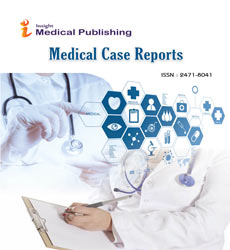Empowering Healthcare: The Evolution and Importance of Medical Reporting Databases
Thomas Chung
Department of Medical, University of Campinas, Campinas, Brazil
Published Date: 2023-08-17DOI10.36648/2471-8041.9.8.335
Thomas Chung*
Department of Medical, University of Campinas, Campinas, Brazil
- *Corresponding Author:
- Thomas Chung
Department of Medical,
University of Campinas, Campinas,
Brazil
E-mail: Chung_T@gmail.group.co.in
Received date: July 17, 2023, Manuscript No. IPMCRS-23-17714; Editor assigned date: July 20, 2023, PreQC No. IPMCRS-23-17714 (PQ); Reviewed date: August 03, 2023, QC No. IPMCRS-23-17714; Revised date: August 10, 2023, Manuscript No. IPMCRS-23-17714 (R); Published date: August 17, 2023, DOI: 10.36648/2471-8041.9.8.335
Citation: Chung T (2023) Empowering Healthcare: The Evolution and Importance of Medical Reporting Databases. Med Case Rep Vol.9 No.8:335.
Description
A medical reporting database is a structured collection of medical information and records used to store, manage, and retrieve various types of medical data. These databases are crucial for maintaining accurate patient records, facilitating healthcare operations, conducting research, and ensuring patient safety. Medical reporting databases can include a wide range of information, such as patient information demographic details, medical history, contact information, insurance details, and more. Medical records clinical notes, diagnosis, treatment plans, medications, lab results, imaging reports, and surgical reports. Imaging data X-rays, MRIs, CT scans, ultrasounds, and other medical imaging reports. Laboratory results blood tests, urine tests, genetic tests, and other laboratory findings. Treatment history information about past and ongoing treatments, including medications and therapies. Allergies and adverse reactions details about patient allergies and any adverse reactions to medications. Electronic Health Records (EHR) comprehensive digital records that encompass a patient's health history from various healthcare providers. Billing and financial information: Records related to medical billing, insurance claims, and payment history. Research data anonymized data used for medical research and clinical studies. Healthcare provider notes from doctors, nurses, and other healthcare professionals regarding patient visits, treatment plans, and observations. Follow-up and appointments scheduling and tracking of patient appointments and follow-up visits. Public health reporting data related to disease outbreaks, epidemiological trends, and public health management.
Medical Information Systems and Software
These databases can be managed using specialized medical information systems and software, often referred to as Electronic Health Record (EHR) systems or Hospital Information Systems (HIS). These systems ensure data integrity, security, and accessibility while adhering to relevant privacy regulations like HIPAA (Health Insurance Portability and Accountability Act) in the United States. The benefits of a well-maintained medical reporting database include improved patient care coordination, faster access to medical information, reduced medical errors, support for evidence-based decision-making, and opportunities for medical research and analysis. However, it's essential to implement robust security measures to protect patient privacy and comply with data protection regulations. A medical reporting database is a specialized type of database that is designed to store and manage medical information, such as patient records, diagnostic reports, treatment plans, medical imaging data (like X-rays and MRIs), laboratory results, and other healthcare-related data. This type of database is crucial for healthcare facilities, medical professionals, researchers, and administrators to efficiently manage and access medical information for patient care, research, and administrative purposes. Key features of a medical reporting database may include patient records storing detailed and accurate patient information, including personal details, medical history, allergies, current medications, and more diagnostic reports storing and organizing diagnostic reports from various medical tests and procedures. Treatment plans keeping track of treatment plans, medications prescribed, and any changes in the patient's condition. Medical imaging data storing and managing medical images, such as X-rays, MRIs, CT scans, and more, for diagnosis and treatment monitoring. Laboratory rsults storing and tracking laboratory test results, such as blood tests, urine tests, and other relevant medical tests. Security and privacy ensuring strict access controls, encryption, and compliance with healthcare data privacy regulations (e.g., HIPAA in the United States). Search and retrieval providing efficient search and retrieval capabilities to find specific patient information or medical reports quickly. Integration ability to integrate with other healthcare systems and tools used in medical facilities, such as Electronic Health Record (EHR) systems, Picture Archiving and Communication Systems (PACS), and more. Data analytics optionally, enabling data analysis and reporting features to identify trends, conduct research, and improve healthcare outcomes. Scalability and performance: Handling a large volume of data with good performance, as medical databases can become quite large. It's important to note that medical reporting databases must adhere to strict regulations and guidelines to ensure the privacy and security of patient information. As of my last knowledge update in September 2021, these regulations include HIPAA (Health Insurance Portability and Accountability Act) in the United States, and similar regulations exist in other countries to protect patient data. If you're considering implementing a medical reporting database, it's crucial to work with professionals who understand the healthcare industry's unique requirements and compliance needs. A medical reporting database is a structured collection of medical information and records that are stored electronically for easy access and retrieval. These databases play a crucial role in healthcare systems by centralizing patient information, facilitating efficient record-keeping, supporting medical research, and assisting healthcare professionals in making informed decisions. Key features and components of a medical reporting database may include Patient Records These include personal information, medical history, diagnoses, treatments, medications, allergies, and other relevant clinical data. Patient identifiers are typically stored in a secure and anonymized manner to protect patient privacy.
Electronic Health Records (EHRs)
Electronic Health Records (EHRs) EHRs are digital versions of patients' paper charts. They contain comprehensive and realtime information about a patient's health status and treatment history, which can be accessed by authorized healthcare providers across different locations. Laboratory Results Test results, such as blood tests, imaging reports, and other diagnostic information, are often integrated into the database to provide a complete picture of the patient's health. Prescription and Medication Records Information about prescribed medications, dosage instructions, and patient compliance can help prevent drug interactions and monitor patient outcomes. Billing and insurance information these records document the financial aspects of medical care, including insurance coverage, billing codes, and payment history. Appointment scheduling some databases include features for scheduling patient appointments and managing healthcare provider availability. clinical decision support integration of medical knowledge and algorithms to assist healthcare professionals in making informed decisions about diagnoses, treatment plans, and interventions. Reporting and analytics databases can generate reports and analyses that provide insights into patient demographics, disease prevalence, treatment effectiveness, and other trends. This data can be valuable for medical research and public health initiatives. Security and privacy measures given the sensitive nature of medical information, robust security measures are essential to ensure data confidentiality, integrity, and compliance with privacy regulations such as the Health Insurance Portability and Accountability Act (HIPAA) in the United States. Interoperability databases need to be designed to allow for easy sharing and exchange of information between different healthcare providers and systems. This facilitates continuity of care when patients visit multiple healthcare facilities. Data Backup and Recovery Regular data backups and disaster recovery plans are crucial to prevent data loss and ensure that medical records.

Open Access Journals
- Aquaculture & Veterinary Science
- Chemistry & Chemical Sciences
- Clinical Sciences
- Engineering
- General Science
- Genetics & Molecular Biology
- Health Care & Nursing
- Immunology & Microbiology
- Materials Science
- Mathematics & Physics
- Medical Sciences
- Neurology & Psychiatry
- Oncology & Cancer Science
- Pharmaceutical Sciences
